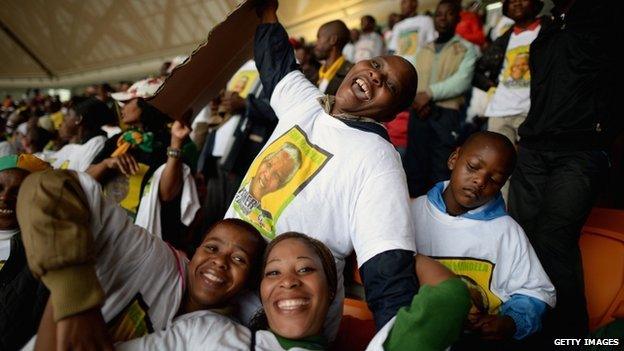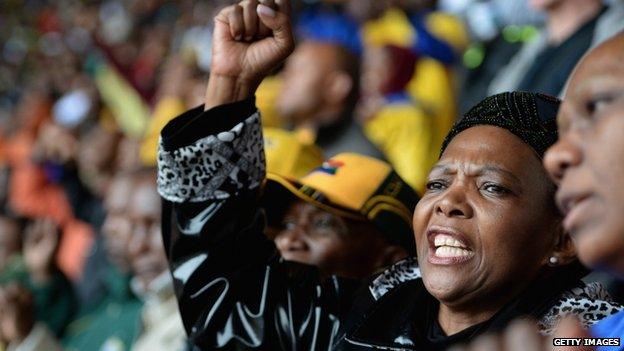Mandela memorial binds South Africans
- Published
There is a celebratory atmosphere among the crowds waiting to get into the stadium
How do you pay tribute to a man who gave millions of South Africans the chance to start again, the chance to rebuild a broken and divided nation?
You celebrate his life.
A day that was meant to be filled with sorrow and outpourings of grief became a day of celebration as thousands of people from different races and all over the country gathered at the FNB Stadium to say their final goodbyes.
Black, white, Asian and coloured (mixed race) people stood shoulder to shoulder, singing and dancing.
"It's like we're back. It's like the day we voted in 1994. It's a privilege for me to be here," said Myrna Lewis, from Parkwood, an affluent neighbourhood of Johannesburg.
Sporting an African National Congress (ANC) hat bought from vendors at the entrance of the stadium, the white woman added: "We needed this moment to remind us what it is to be South African. Once again, Mandela has brought us together."
Her friend Britta Courtenay, 57, agrees.
"I wish we could bottle this feeling we all have now so we never forget what Mandela did for us.
"I wish we could somehow capture the feeling of this moment and use it to move the country forward. We owe Mandela so much," she beamed.
This is one of the few times the pair have ventured into Soweto - they told me that they had left their homes because they "wanted to be with the people, with all South Africans".

The multitudes gathered have braved the unseasonably cold weather and rain to be part of the day's events.
But rain at a gathering such as this is seen as a good sign in traditional South African culture and a sign that the ancestors have welcomed the deceased person's spirit.
'Sharing Mandela with the world'
The venue is a sea of colourful umbrellas, many men and women wearing Mandela T-shirts. Others are wearing T-shirts from their political parties.
The crowds cheered when Mr Mandela's widow, Graca Machel, dressed in black, led her family onto the stage set up for the family.
His grandchildren read out a tribute in which they said they saluted Mr Mandela for his vision and spoke of his modesty.
Mr Mandela himself did not think he was anything special; he always joked about this.
Nelson Mandela's great granddaughter Phumla Mandela: "You tower over the world like a comet"
But still in the eyes of the people here, Madiba, as he is affectionately known, was more than an ordinary man as the group of world leaders here seems to prove.
The guests include US President Barack Obama, UK Prime Minister David Cameron and UN Secretary General Ban Ki-moon.
President Obama thanked South Africans for sharing Mr Mandela with the world. He said Mr Mandela "inspired him to be a better man".
"It took a man like Madiba to free not just the prisoner but the jailor," Mr Obama said to a standing ovation.
He added that Mr Mandela embodied the spirit of "uBuntu", which means "I am because you are".
'Pain to joy'
Thousands more South Africans watched the proceedings around the country in local stadiums, where screens had been erected to show the event live.
Mourner Shirley Magano: "A great hero, a great South African man, has fallen"
The last time Mr Mandela would have seen this many people was at the closing ceremony of the 2010 World Cup - in the same stadium. After that appearance, his health began to progressively deteriorate.
For some this will be their only chance to say their farewell to the man they fondly called Tata, meaning "father" - a simple word that encapsulates this nation's great love for him.
Mr Mandela will be buried in Qunu, the village where he grew up in the Eastern Cape Province, a 10-hour drive from Johannesburg.
When I ask some in the crowd what Mr Mandela means to them, many pause and smile before answering as if struggling to find the right words.
"This man. This man gave us everything. He turned our pain into joy," says Thembi Khumalo, 68, her voice shaking.
On the day of his release, 11 February 1990, Mandela addressed thousands of anxious South Africans at this stadium, which was smaller than before it was revamped.
"I was at this stadium on the day Mandela was released. It was like the heavens opened when we saw him. We were so excited," she adds.
Ms Khumalo said she feels some of that day's excitement today because although he is gone, "We can feel his spirit of unity."
"Who else can bring us together like this?" she said, pointing at the multiracial crowd.
War cries
Nomfundo Dladla from Port Shepstone in KwaZulu-Natal agrees.
"If you didn't live under apartheid, you won't know how painful it was. But in spite of that pain, Mandela showed us that we need to forgive: look at us now," she says.

It is almost 20 years since democracy arrived in South Africa but race is still a thorny issue - and not all differences have been forgotten.
And to pay tribute to the man who preached peace to a people who were ready to go into civil war, they are celebrate his life in song.
Struggle songs were a big part of South Africa's apartheid history.
Anti-apartheid activists sang about the men who were languishing on Robben Island and those who were in exile, far from their loved ones.
Sometimes the songs were mournful; at other times they were a war cry.
But on this day the same songs are being sung to comfort the Mandela family - to show his family that South Africans has not forgotten his role.
"Viva Madiba, Viva," the multitudes chanted.
Others sang, "Oliver Tambo thetha noBotha akhulule uMandela azobusa" - meaning "Oliver, speak to Botha to free Mandela so he can come and lead".
This was a particularly popular song in the late 1980s, in the run-up to Mr Mandela's release, when Oliver Tambo was leading the ANC in exile and PW Botha was president of the apartheid regime.
Banners of Mr Mandela are hanging around the 95,000-capacity stadium. In the middle is a big screen with a picture of a smiling Mandela - looking healthy and happy, as the world and many South Africans remember him.
South Africa has never known a man like Mr Mandela, but many here believe that it is possible to build on his legacy.
They say that even in death, Mr Mandela has brought them closer - once more, it feels as though nothing is impossible.